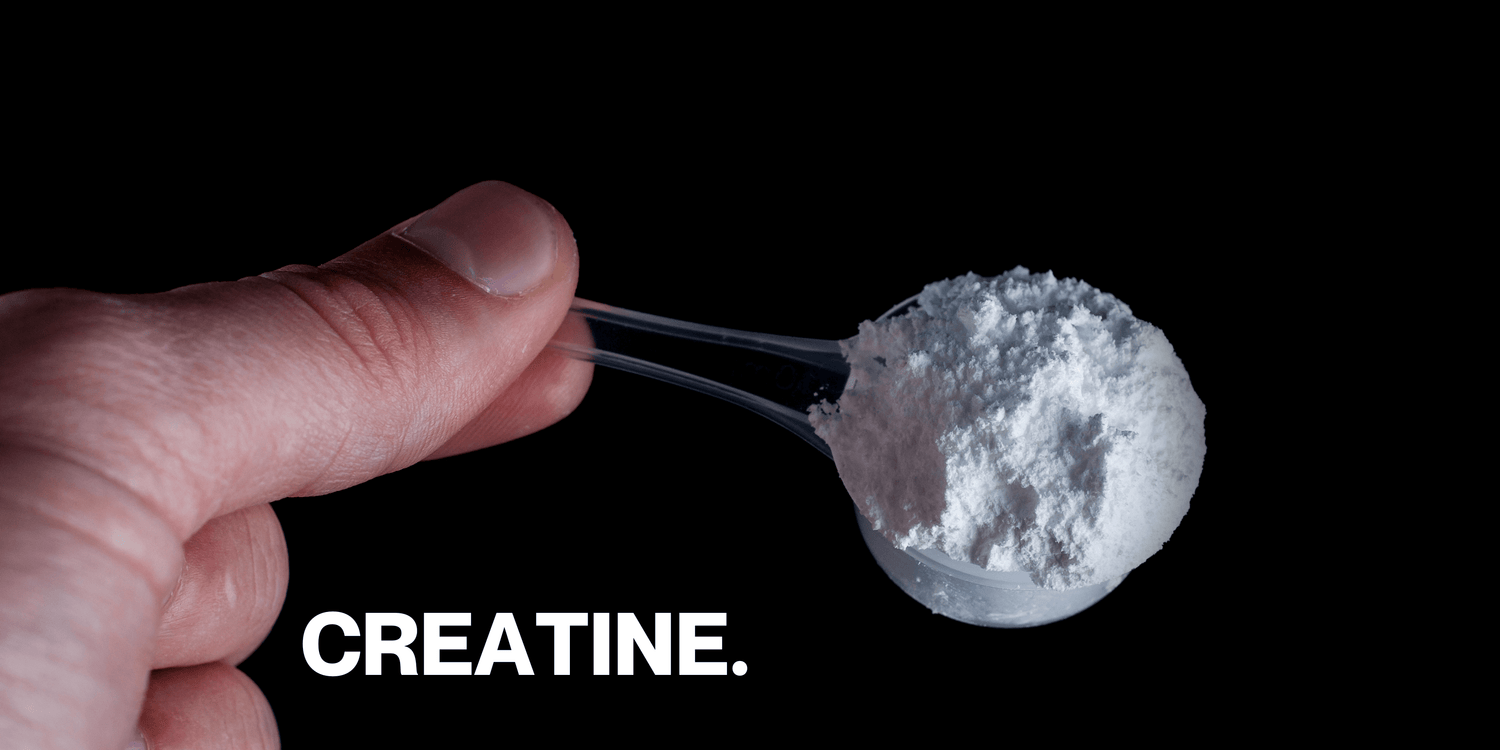Welcome to the ultimate guide to creatine!
Want to know more about this popular supplement and why so many people are using it? Look no further because we have all the answers for you.
Table of contents
What is creatine?
Creatine is a natural substance that is mainly found in the muscles of our body. It is a compound that consists of three amino acids: arginine, glycine and methionine. In most people, creatine is produced in small amounts by the liver, kidneys and pancreas. In addition, creatine is also found in food, especially in animal products such as meat and fish. Therefore, vegetarians and vegans often get less creatine than people who eat meat, which may give them an advantage in supplementation.
Creatine plays a crucial role in our body’s energy production, especially during short, intense workouts. When we need energy, creatine is converted into creatine phosphate, which helps regenerate adenosine triphosphate (ATP), the main energy carrier in our cells. This rapid energy delivery is what makes creatine so appealing to athletes and fitness enthusiasts, as it allows them to train harder and longer.
The use of creatine supplements has skyrocketed in recent years, especially among athletes looking to improve their performance. It’s one of the most studied supplements and is often promoted for its effectiveness and safety. But what are the real benefits of creatine and how can it help you with your fitness goals? We’ll explore that further in this guide.
How does creatine work?
Creatine works by increasing the energy supply to your muscles, especially during intense training sessions. When you perform a short burst of activity, such as a sprint or a heavy lift, your muscles’ ATP stores are quickly depleted. Creatine helps with this by speeding up ATP regeneration, allowing you to continue at the same intensity even as your muscles begin to fatigue.
The way creatine works is also related to the storage of phosphate in your muscles. Creatine phosphate acts as a kind of energy battery, which can be quickly called upon when needed. This means that you can generate more power and explosiveness during short, intense efforts. This is especially beneficial for athletes involved in activities such as sprinting, weightlifting and other forms of high-intensity training.
Additionally, creatine also affects cell hydration. When creatine accumulates in muscle cells, it attracts water, leading to an increase in cell volume. This can potentially promote muscle protein synthesis and contribute to muscle growth. The combination of improved energy production and increased cell hydration makes creatine a powerful tool for anyone looking to optimize their workouts.
Benefits of using creatine
There are many benefits to using creatine that can help athletes and fitness enthusiasts improve their performance. One of the most noticeable benefits is an increase in strength and explosiveness. Studies have shown that athletes who use creatine are often able to lift heavier weights and perform more repetitions than those who do not use creatine. This can lead to faster progress in strength training and overall performance.
In addition, creatine can also contribute to improved endurance during intense training. Due to the faster regeneration of ATP, athletes can train for longer periods of time at high intensity without feeling tired quickly. This is especially useful for athletes who participate in sports that require repeated short bursts of energy, such as rugby, basketball or sprinting.
In addition to its direct benefits to athletic performance, there is also evidence that creatine can help promote muscle growth. Increased cell hydration and improved energy production allow muscles to recover and grow faster after a tough workout. This makes creatine a valuable supplement for anyone serious about strength training and muscle building.
Scientific research on creatine
Scientific research on creatine is extensive and demonstrates that it is a safe and effective supplement for both athletes and recreational athletes. Numerous studies have substantiated the benefits of creatine, with over 70% of participants showing significant improvements in strength and performance after taking creatine. This has led to a widely accepted consensus within the sports science community regarding its effectiveness.
One of the most notable studies showed that creatine supplementation can improve performance in short-term, high-intensity exercise by over 10%. This makes it particularly useful for athletes involved in activities that rely on explosive power and speed. Additionally, there is evidence that creatine can also increase overall training frequency, contributing to faster gains in muscle mass and strength.
In addition to performance, there are also studies examining the role of creatine in post-workout recovery. Creatine has been shown to reduce muscle damage and shorten recovery time, allowing athletes to return to their training regimen more quickly. This makes creatine not only a powerful tool for improving performance, but also for supporting recovery processes.
Different forms of creatine
There are several forms of creatine on the market, each with their own characteristics and benefits. The most popular form is creatine monohydrate, which has been well researched and is considered the gold standard. Creatine monohydrate is effective, affordable, and readily available. It is the form most often used in scientific studies and has been proven to be safe and effective.
In addition to creatine monohydrate, there are other forms, such as creatine ethyl ester, creatine hydrochloride and creatine malate. These variants are often promoted as better absorbable or more effective than monohydrate, but the evidence for this is often limited. Many users prefer creatine monohydrate because of its proven effectiveness and wide availability.
It is important to note that the choice of a particular form of creatine also depends on personal preference and tolerance. Some people experience stomach upset when using creatine monohydrate, while others respond better to a different form. It is therefore advisable to explore different options and see which one works best for your body and training schedule.
How to use creatine
Using creatine is relatively simple, but there are some guidelines you can follow to get the best results. Most experts recommend starting with a loading phase, where you take a higher dose for the first 5-7 days, usually around 20 grams per day, divided into four doses. This helps to quickly increase creatine levels in your muscles.
After the loading phase, you can switch to a maintenance dose of 3 to 5 grams per day. This is sufficient to maintain creatine levels and continue to experience the benefits. It is advisable to take creatine with a source of carbohydrates, such as a smoothie or sports drink, to improve absorption.
In addition, it is important to drink enough water while using creatine. Due to the increased cell hydration, the use of creatine can lead to an increased need for fluid. Make sure you stay well hydrated to prevent any side effects and maximize the effectiveness of the supplement.
Creatine Side Effects and Safety
Creatine is generally considered a safe supplement when used correctly. Most people do not experience significant side effects when taking creatine, especially when they follow the recommended dosage. However, some users may experience mild side effects such as stomach upset, diarrhea, or cramping. These symptoms can often be reduced by taking creatine with food and drinking plenty of water.
There have also been concerns about the impact of creatine on the kidneys, especially in people with existing kidney problems. However, research has shown that creatine is safe for healthy individuals and does not negatively affect kidney function. However, it is always advisable to consult a doctor before beginning supplementation, especially if you have any health conditions or are taking other medications.
Finally, it is important to emphasize that creatine is not for everyone. Young people and people with certain medical conditions should be cautious when using supplements. It is essential to be well informed and make an informed decision about using creatine as part of your fitness regime.
Creatine and sports performance
The benefits of creatine for athletic performance are well documented in the literature. Athletes who use creatine often report improvements in strength, speed, and overall performance. This is especially evident in sports that rely on short, intense efforts, such as weightlifting, sprinting, and team sports like soccer and basketball. The increased ATP regeneration and improved energy production allow athletes to get more out of their workouts.
In addition, creatine can also have a positive effect on mental focus and motivation during training. Some studies suggest that creatine can improve cognitive function, especially in stressful situations such as competition. This can help athletes perform better under pressure, which is crucial in competitive environments.
Additionally, there is growing evidence that creatine is not only beneficial for strength athletes, but also for endurance athletes. While creatine has traditionally been associated with short bursts of strength, recent research shows that it can also help improve overall training capacity and recovery, which is important for endurance athletes who need to adapt to long-term training demands .
Creatine and muscle building
The role of creatine in muscle building is one of the main reasons why many people use the supplement. Creatine not only promotes energy production, but also influences several cellular processes involved in muscle growth. One of the most important mechanisms is increased muscle protein synthesis, which is essential for building muscle mass.
When creatine enters muscle cells, it attracts water and increases cell hydration. This creates an environment conducive to muscle growth. Additionally, creatine stimulates the release of growth hormones, such as insulin, which help repair and build muscle tissue after a workout. This makes creatine an indispensable tool for anyone serious about strength training and muscle building.
Additionally, there is evidence that creatine helps reduce muscle breakdown during intense training sessions. Increased energy stores and improved recovery capacity allow athletes to train more often and more intensely, leading to faster and more effective results in their muscle building. This makes creatine not only a strength supplement, but also for those who focus on building muscle mass.
Conclusion: Is Creatine Worth Using?
In summary, creatine is one of the most effective and researched supplements available to athletes and fitness enthusiasts. The benefits are numerous, ranging from improved strength and performance to accelerated muscle growth and recovery. With the right dosage and use, creatine can be a valuable addition to your training regimen, regardless of your sport or fitness goals.
However, it is important to remember that creatine is not for everyone. People with underlying health conditions or specific dietary restrictions should exercise caution and consult their doctor before beginning supplementation. Additionally, it is essential to combine creatine with a proper diet and structured exercise program to achieve the best results.
If you are serious about improving your athletic performance and building muscle, creatine is definitely worth considering. It offers a safe, effective, and scientifically proven way to achieve your fitness goals. Take the time to educate yourself and make an informed decision so that you can get the most out of your creatine supplementation.





Leave a comment
All comments are moderated before being published.
This site is protected by hCaptcha and the hCaptcha Privacy Policy and Terms of Service apply.